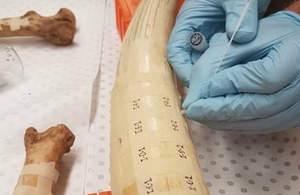Global S&T Development Trend Analysis Platform of Resources and Environment
| Forensics network develops better detection methods | |
| admin | |
| 2018-04-06 | |
| 发布年 | 2018 |
| 语种 | 英语 |
| 国家 | 英国 |
| 领域 | 气候变化 |
| 正文(英文) | The African Wildlife Forensics Network is helping to increase prosecutions of illicit traders and poachers whilst delivering a legacy for British Government funding. 
A government-funded project which is helping to bring an end to the illegal wildlife trade has secured an injection of cash to help African countries crack down on illicit traders and poachers. The African Wildlife Forensics Network started in 2015 with support from Defra’s Illegal Wildlife Trade Challenge Fund, and delivers improved evidence gathering and analysis to support prosecutions and clamp down on the illegal wildlife trade. Led by the United Nations Office on Drugs and Crime (UNODC) with TRACE Wildlife Forensics Network (TRACE) and TRAFFIC, the initial Defra-funded project has secured a legacy for wildlife officials in Malawi, Zambia and Zimbabwe as they will receive specialist training for carrying out wildlife forensic investigations thanks to the support of £400,000 over two years from players of the People’s Postcode Lottery. Eight African countries have taken part in this project and it is delivering wildlife forensic capacity through training and equipment and developing national and regional level plans for further development and coordination of wildlife forensic services. Jorge Rios, Chief of UNODC’s Global Programme for Combating Wildlife and Forest Crime said:
Another of the highlights from across Africa involving the African Wildlife Forensics Network has been the significant progress seen in Zambia. Recent changes to the national Wildlife Act have markedly increased penalties for wildlife crime, resulting in fewer guilty pleas and a greater requirement for robust evidence to support prosecutions. Following completion of the Zambia wildlife forensics needs assessment, and the subsequent participation of the Zambian Department of National Parks and Wildlife (DNPW) at the AWFN workshop in Gaborone, Botswana, in May 2016, the Project Team worked with DNPW to plan how forensic science could best support national wildlife law enforcement. In Botswana, specific training was provided to the Botswana Police Service’s Forensic Science Service (BPS-FSS) in the area of DNA species identification. UK scientists worked with the Botswana Department Wildlife and National Parks who hosted one of the regional project workshops. Environment Minister Thérèse Coffey said:
Rob Ogden, co-Director of TRACE said:
Environment Minister, Thérèse Coffey this week visited Kenya (3 – 4 April) to discuss efforts to tackle the illegal trade in wildlife and to see projects directly making an impact in the conviction and jailing of criminals involved in these crimes. Kenya is the fourth biggest recipient of Illegal Wildlife Trade Challenge Fund money with more than £1.9 million committed through eight IWT Challenge Fund projects that involve Kenya. The Minister visited the Kenya Wildlife Service where she saw fingerprinting technology developed in the UK to trace ivory poachers. This technology has already been used to arrest 15 poachers in Kenya.
Published 6 April 2018
|
| URL | 查看原文 |
| 来源平台 | gov.uk-Department for Environment, Food and Rural Affairs |
| 文献类型 | 新闻 |
| 条目标识符 | http://119.78.100.173/C666/handle/2XK7JSWQ/106006 |
| 专题 | 气候变化 |
| 推荐引用方式 GB/T 7714 | admin. Forensics network develops better detection methods. 2018. |
| 条目包含的文件 | 条目无相关文件。 | |||||
| 个性服务 |
| 推荐该条目 |
| 保存到收藏夹 |
| 查看访问统计 |
| 导出为Endnote文件 |
| 谷歌学术 |
| 谷歌学术中相似的文章 |
| [admin]的文章 |
| 百度学术 |
| 百度学术中相似的文章 |
| [admin]的文章 |
| 必应学术 |
| 必应学术中相似的文章 |
| [admin]的文章 |
| 相关权益政策 |
| 暂无数据 |
| 收藏/分享 |
除非特别说明,本系统中所有内容都受版权保护,并保留所有权利。
修改评论